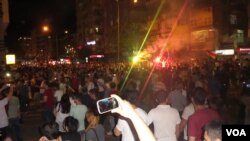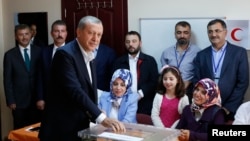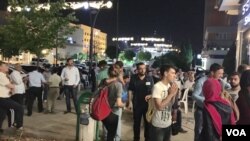Turkey’s ruling AK Party lost its absolute majority in parliamentary elections on Sunday - a stunning defeat for President Recep Tayyip Erdogan's bid to rewrite the nation's constitution and create a presidential democracy. The results will force Erdogan's party to form a coalition government for the first time since he took power in 2002.
Thirteen years of the AK Party dominating parliament with crushing majorities are over. While AKP will remain the largest party in parliament, it suffered heavy losses in Sunday's election.
With virtually all votes tallied, unofficial results showed Erdogan's Islamic-rooted AKP winning 41 percent of the vote - or about 225 seats - well down from the nearly 50 percent it won four years ago.
A faltering economy is cited as a key factor behind the losses after a decade of unprecedented economic growth for Turkey. But it was the success of the pro-Kurdish HDP, in breaking through the 10 percent vote count threshold, that did the most damage to the AK Party. The around 75 seats it secured will come almost exclusively from the governing party, its chief rival in the Kurdish regions.
The HDP is widely considered to have fought an inspired campaign in reaching out beyond its Kurdish base to Turkish voters on an inclusive platform of pluralism and democracy, highlighting the rights of workers, women and gays.
Co-chairman of the HDP, Selahattin Demirtas, acknowledged the breadth of support.
“I am aware many people have lent us their votes,” he said. “What I promise by our actions is we will make those votes ours.”
The broad support for the HDP across the country is seen as symbolically important after decades-long ethnic tensions.
The main secular opposition Republican People's Party, CHP, won about 25 percent of the vote, while the far-right Nationalist Movement Party, MHP, won a little more than 16 percent.
Prime Minister Ahmet Davutoglu, the leader of the AK Party, already is facing growing criticism for a lackluster campaign. Addressing a crowd of supporters, Davutoglu took a defiant approach.
“We will not bend from our stances. Nothing will change,” he said.
But the result will be a blow to the AK Party’s goal to change Turkey from a parliamentary system to an executive presidency. The party was looking for a three-fifths majority to push through the reforms. All the opposition parties strongly opposed the move.
HDP leader Demirtas reiterated his opposition and ruled out any coalition with the AK Party. The opposition parties also oppose the current foreign policy of strongly backing Syrian rebels fighting the Assad government.
Facing such opposition is expected to make building a long-term coalition government difficult. Any coalition already is being predicted to be temporary with calls within the AK Party to call early elections in the next few months, possibly with a new leader in a bid to restore its majority.
More than 53 million voters were eligible to cast ballots. Had the AKP won 330 seats, it could have called for a national referendum to change the constitution. It needed 367 seats to bring the change to a vote without a referendum.













